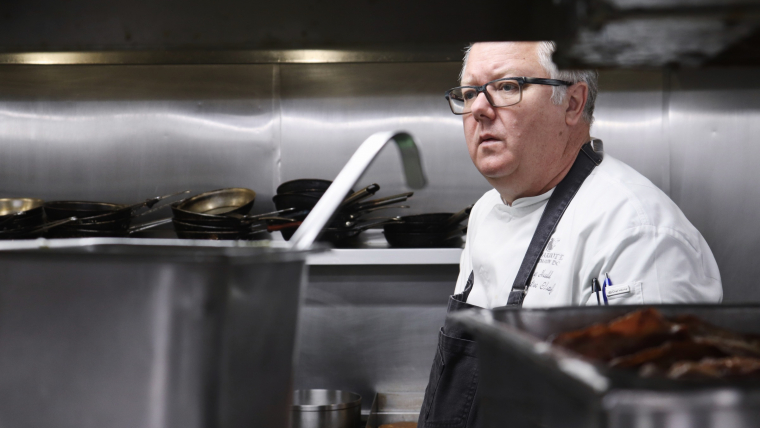A sustainable Northern Italian restaurant that opened in summer 2024, Ama is a mission-driven restaurant committed to the well-being of both its team members and guests. Johanna Hellrigl, chef and owner of Ama, was raised and trained in the restaurant industry. Watching her father work in Italy, New York and Washington D.C., inspired Johanna to make her own stamp in the industry in a sustainable way. Her and her husband, Micah Wilder, who is the creative force behind the beverage program, worked tirelessly to make this vision a reality.
 It took nearly eight years to manifest an environment that brings together community, wellness and sustainability with the help and support from friends and investors, , Chef de Cucina Ian Whalley and Food & Beverage Manager Chef Brandon Nguyen. Johanna could not be more happy to have them on her team, along with approximately 35 employees.
It took nearly eight years to manifest an environment that brings together community, wellness and sustainability with the help and support from friends and investors, , Chef de Cucina Ian Whalley and Food & Beverage Manager Chef Brandon Nguyen. Johanna could not be more happy to have them on her team, along with approximately 35 employees.
Less than a year after opening, Ama is the only restaurant to receive a District Sustainability Award from the DC Department of Energy & Environment and Sustainable DC in 2025.
Ama accomplished this by combating the norm of owning and running a restaurant with one important practice…question everything!
What Happens Before Food Arrives at Ama?
Ama chooses to sustainably source its meat, fish and produce. The restaurant supports farms that embrace regenerative agriculture and recognize the importance of using healthy soil for healthy food.
Compost Crew couldn’t agree more as we work to produce compost on local farms where 70% of that compost is applied to these farms to help grow nutrient-rich produce that then can be sold to restaurants like Ama.
 What Happens in the Kitchen?
What Happens in the Kitchen?
Employees work to conserve in the kitchen. Ama has invested in all-electric equipment that reduces air pollution and employees exposure to carbon dioxide. Ama also avoids bringing plastic–especially single-use plastic– into the kitchen by purchasing items like steel containers for storage, instead. This keeps food fresh, prevents the leaching of chemicals & microplastics into the food and successfully reduces what gets sent to landfill.
How’s the water?
Ama utilizes an electrolysis purifier for all produce-washing. For drinking and cooking, water is filtered through a double catalytic carbon filtration system to remove contaminants while retaining essential minerals. After customers are done with their meals, dishes are sent to Ama’s plate-scraping system that utilizes 93% less water than a spray nozzle!
Why Compost?
The District’s laws on food waste have made some businesses feel pressure to reduce waste but in Johanna’s view, “[We] shouldn’t need to wait for a law to be enforced. I wanted to compost, regardless.”
She was on a mission to find a hauler to pick-up the food scraps at Ama with hopes that the large hotel above her restaurant would also want access to organics recycling. Despite successfully encouraging her building’s waste management to prioritize recycling, she still decided to seek out a local small business to support that is transparent about where the waste goes and how it is processed and used locally. Compost Crew now comes 1-2 times per week, retrieving food scraps from two 65 gallon bins as Ama preps, cooks and serves breakfast, lunch and dinner throughout the week.
“Health and sustainability go hand in hand. To have healthy soil, we have to do our part. How do we trash? We have huge zero-waste initiatives at the restaurant, starting with less waste in the first place then finding somewhere to ‘trash’ it.” -Johanna Hellrigl, Chef and Owner of Ama
What Happens When Customers Take Food To-go?
Customers stop by the street facing counter to pick up menu items like coffee, focaccia and even blueberry crostatas! Ama is not easily fooled by greenwashing or the hope that everyone will choose to use or have accessibility to compost bins.
 “We wanted to be realistic. We chose biodegradable, plastic-free cups so we don’t lead [customers] astray and act like they are doing something by giving them commercially compostable cups. We can give them compostable products but we can’t guarantee that they will actually compost it.” -Johanna H.
“We wanted to be realistic. We chose biodegradable, plastic-free cups so we don’t lead [customers] astray and act like they are doing something by giving them commercially compostable cups. We can give them compostable products but we can’t guarantee that they will actually compost it.” -Johanna H.
Johanna took the time to find wax-free packaging, and wooden stirrers from businesses like Key Compostables, all of which can be composted.
How can Ama Compost Well?
Ama developed a composting policy and thorough training, led by Brandon and Ian, with programming they have used at other restaurants and signage from Compost Crew.
The team also ensures that it’s easy for staff to differentiate between waste bins by using green BPI-certified liners for its compost bins. There are no bins in the main area of the restaurant. Instead, Ama’s crew takes what is left from customers and carefully disposes of it at the back-of-house.
Ama’s attention to detail has paid off, nipping waste production at the bud and leaving the rest for Compost Crew to pick-up. Starting just one year ago, Ama has diverted nearly 20,000 pounds of food scraps from landfills! The restaurant’s commitment and curiosity about how to do better for the planet continues at Ama.
By: Carlye Brooks



